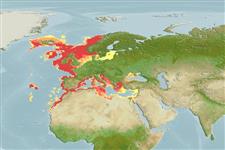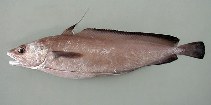Phycis blennoides (Brünnich, 1768)
Greater forkbeard
Добавить Ваши наблюдения в Fish Watcher
| Native range | All suitable habitat | Point map | Year 2050 |

|
| This map was computer-generated and has not yet been reviewed. |
| Phycis blennoides AquaMaps Data sources: GBIF OBIS |
Загрузить свой Фото и Видео
Pictures | Videos | Изображение на GooglePhycis blennoides
Female picture by Cambraia Duarte, P.M.N. (c)ImagDOP
Pictures | Videos | Изображение на GooglePhycis blennoides
Female picture by Cambraia Duarte, P.M.N. (c)ImagDOP
Türkiye country information
Common names:
Çatalsakalgelincik balığı, Gelincik, Gelincik balığı
Occurrence: native
Salinity: marine
Abundance: | Ref:
Importance: | Ref:
Aquaculture: | Ref:
Regulations: | Ref:
Uses: no uses
Comments: Also Ref. 1371. Status of threat: Vulnerable (Ref. 58342).
National Checklist:
Country Information: https://www.cia.gov/library/publications/resources/the-world-factbook/geos/tu.html
National Fisheries Authority:
Occurrences: Occurrences Point map
Main Ref: Bilecenoğlu, M., Taskavak E., S. Mater and M. Kaya, 2002
National Database: CLOMFOT
Occurrence: native
Salinity: marine
Abundance: | Ref:
Importance: | Ref:
Aquaculture: | Ref:
Regulations: | Ref:
Uses: no uses
Comments: Also Ref. 1371. Status of threat: Vulnerable (Ref. 58342).
National Checklist:
Country Information: https://www.cia.gov/library/publications/resources/the-world-factbook/geos/tu.html
National Fisheries Authority:
Occurrences: Occurrences Point map
Main Ref: Bilecenoğlu, M., Taskavak E., S. Mater and M. Kaya, 2002
National Database: CLOMFOT
Common names from other countries
Классификация / Names народные названия | синонимы | Catalog of Fishes(род, виды) | ITIS | CoL | WoRMS | Cloffa
> Gadiformes (Cods) > Phycidae (Phycid hakes)
Etymology: Phycis: Taken from Greek, phykon = seaweed; because of the habits of this fish that lives hidden among them (Ref. 45335).
Etymology: Phycis: Taken from Greek, phykon = seaweed; because of the habits of this fish that lives hidden among them (Ref. 45335).
Environment: milieu / climate zone / depth range / distribution range экология
морской донно-пелагический; мигрирует в океане (Ref. 51243); пределы глубины 10 - 1351 m (Ref. 104125), usually 100 - 450 m (Ref. 1371). Temperate; 69°N - 20°N, 29°W - 36°E
распространение страны | регионы FAO | Ecosystems | места находок | Point map | интродукции | Faunafri
Eastern Atlantic: Norway and Iceland to Cape Blanc, West Africa; also the Mediterranean.
Length at first maturity / Size / Вес / Возраст
Maturity: Lm ?, range 20 - ? cm
Max length : 110 cm TL самец/пол неопределен; (Ref. 1371); наибольший вес (опубликованные данные): 3.5 kg (Ref. 40637); наибольший возраст (опубликованны данные): 20 годы (Ref. 1371)
Max length : 110 cm TL самец/пол неопределен; (Ref. 1371); наибольший вес (опубликованные данные): 3.5 kg (Ref. 40637); наибольший возраст (опубликованны данные): 20 годы (Ref. 1371)
Краткое описание определительные ключи | морфология | морфометрия
колючие лучи спинного плавника (общее число) : 0; колючие лучи анального плавника: 0. Pelvic fin rays extremely elongated, reaching well beyond the origin of the anal fin. First dorsal fin with an elongate ray. Body color is brown to red-gray dorsally, becoming paler ventrally.
Depth range from 10-800 m (Ref. 1371) and from 300-1047 m in the eastern Ionian Sea (Ref. 56504). Found over sand and mud bottoms (Ref. 1371). Young more coastal and found on the continental shelf while adults migrate along the slope (Ref. 1371). Feed mainly on crustaceans and fishes (Ref. 1371). Commonly less than 45 cm TL (Ref. 1371). Marketed fresh, also as fillets and fishmeal (Ref. 1371).
Life cycle and mating behavior половая зрелость | размножение | нерест | икра | Fecundity | личинки
Основная ссылка
Upload your references | ссылки | координатор | соавторы
Cohen, D.M., T. Inada, T. Iwamoto and N. Scialabba, 1990. FAO species catalogue. Vol. 10. Gadiform fishes of the world (Order Gadiformes). An annotated and illustrated catalogue of cods, hakes, grenadiers and other gadiform fishes known to date. FAO Fish. Synop. 125(10). Rome: FAO. 442 p. (Ref. 1371)
Угроза для людей
Harmless
Использование человеком
рыболовство: коммерческий
FAO(рыболовство: production; publication : search) | FIRMS (Stock assessments) | FishSource | Sea Around Us
дополнительная информация
Population dynamics
Growth parameters
Max. ages / sizes
Length-weight rel.
Length-length rel.
Размерный состав
Mass conversion
пополнение
численность
Growth parameters
Max. ages / sizes
Length-weight rel.
Length-length rel.
Размерный состав
Mass conversion
пополнение
численность
Life cycle
размножение
половая зрелость
Fecundity
нерест
Spawning aggregations
икра
Развитие икры
личинки
динамика численности личинок
размножение
половая зрелость
Fecundity
нерест
Spawning aggregations
икра
Развитие икры
личинки
динамика численности личинок
Physiology
Body composition
Nutrients
Oxygen consumption
Swimming type
Swimming speed
Visual pigments
Fish sound
Diseases & Parasites
Toxicity (LC50s)
Body composition
Nutrients
Oxygen consumption
Swimming type
Swimming speed
Visual pigments
Fish sound
Diseases & Parasites
Toxicity (LC50s)
Genetics
генетика
Heterozygosity
наследуемость
генетика
Heterozygosity
наследуемость
Human related
Aquaculture systems
особенности рыбоводства
степень растяжения
Ciguatera cases
Stamps, coins, misc.
Aquaculture systems
особенности рыбоводства
степень растяжения
Ciguatera cases
Stamps, coins, misc.
инструменты
Bio-Quiz | E-book | полевой определитель | определительные ключи | Длина-Частота | онтогенез | карта точек | Classification Tree
| Catch-MSY |
Специальные отчеты
Проверить содержание в аквариумах | Проверить опубликованные видовые данные | Проверить опубликованные данные по аквакультуре
Скачать в формате XML
ресурсы в Интернет
Aquatic Commons | BHL | Cloffa | Websites from users | Проверить FishWatcher | CISTI | Catalog of Fishes(род, виды) | DiscoverLife | ECOTOX | Faunafri | Fishtrace | GenBank(Геном, Нуклеотид) | GloBI | GOBASE | | Google Books | Google Scholar | Google | IGFA World Record | MitoFish | национальные базы данных | Otolith Atlas of Taiwan Fishes | общественные аквариумы | PubMed | Reef Life Survey | Scirus | SeaLifeBase | Tree of Life | Wikipedia(Вперёд, поиск) | World Records Freshwater Fishing | Zoological Record
Estimates based on models
Preferred temperature (Ref. 115969): 5.4 - 14.6, mean 9.1 (based on 672 cells).
Phylogenetic diversity index (Ref. 82804): PD50 = 0.6255 [Uniqueness, from 0.5 = low to 2.0 = high].
Bayesian length-weight: a=0.00468 (0.00393 - 0.00557), b=3.13 (3.08 - 3.18), in cm Total Length, based on LWR estimates for this species (Ref. 93245).
Trophic level (Ref. 69278): 3.7 ±0.66 se; based on food items.
устойчивость к внешним воздействиям (Ref. 120179): средний (среднего размера), минимальное время удвоения популяции 1.4-4.4 года (K=0.21; tmax=20).
Prior r = 0.55, 95% CL = 0.36 - 0.83, Based on 2 full stock assessments.
Fishing Vulnerability (Ref. 59153): Moderate to high vulnerability (52 of 100).
Climate Vulnerability (Ref. 125649): Moderate vulnerability (38 of 100).




